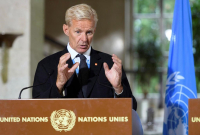Support strong Canadian climate journalism for 2025
MPs have unanimously endorsed a motion to revoke the honorary Canadian citizenship of Myanmar's de facto leader, Aung San Suu Kyi.
The vote, on a Bloc Quebecois motion, followed Thursday's question period and came one day after Prime Minister Justin Trudeau said it was up to Parliament to decide whether to strip the honour given to Suu Kyi in 2007.
The once-celebrated Burmese reformer has been widely criticized for not speaking out against the atrocities being committed against her country's Rohingya people. Trudeau's Liberals had faced pressure to revoke the honour, but had refused to say whether they would consider such a step.
A spokesman for Foreign Affairs Minister Chrystia Freeland said Thursday that the government made up its mind to support the idea in response to Suu Kyi's silence on the crimes in Myanmar.
"Our government supported this motion in response to her continued failure to speak out against the genocide of the Rohingya, a crime being committed by the military with which she shares power," Adam Austen wrote in an emailed statement.
"We will continue to support the Rohingya people through humanitarian assistance, targeted sanctions against Myanmar's generals and by pushing for accountability for those responsible through an appropriate international body."
The Opposition Conservatives called the vote to remove her citizenship a "step in the right direction," but pressed the Liberals to do more for the Rohingya people "than make a symbolic gesture."
There is no formal procedure required for making someone an honorary citizen — it is a purely political decision — but precedent has been set for a joint resolution to be passed by the House of Commons and Senate in order to grant someone the honour.
The Bloc MP who put forward the motion to strip Suu Kyi of the honorary citizenship was happy to attract cross-party support, but he was uncertain — as many were — about the exact process the government must now follow.
"What I know (is) it is the House that can give this honorary citizenship and now it has also the power to remove it. That's what we've just done," Gabriel Ste-Marie, who represents the riding of Joliette north of Montreal, told reporters after the vote.
Suu Kyi is one of six people who have been granted honorary citizenship by the federal government, and the only one who wasn't presented with the honour at a ceremony in Canada. She received her honorary citizenship during a 2012 visit to Myanmar by then foreign affairs minister John Baird.
Last week, the House of Commons unanimously adopted a motion to recognize the crimes against the Rohingya as genocide and to endorse a United Nations fact-finding mission outlining crimes against humanity by the Myanmar military.
The extensive report documented the systematic targeting of civilian Rohingya by the military, including mass gang rape, sexual slavery and the razing of hundreds of villages.
Ste-Marie said it wouldn't make sense for MPs to call the crisis a genocide and then not remove Suu Kyi's honorary citizenship.
"If you're an accomplice (to) a genocide, you won't have honorary citizenship here. This is a nonsense," he said.





Comments